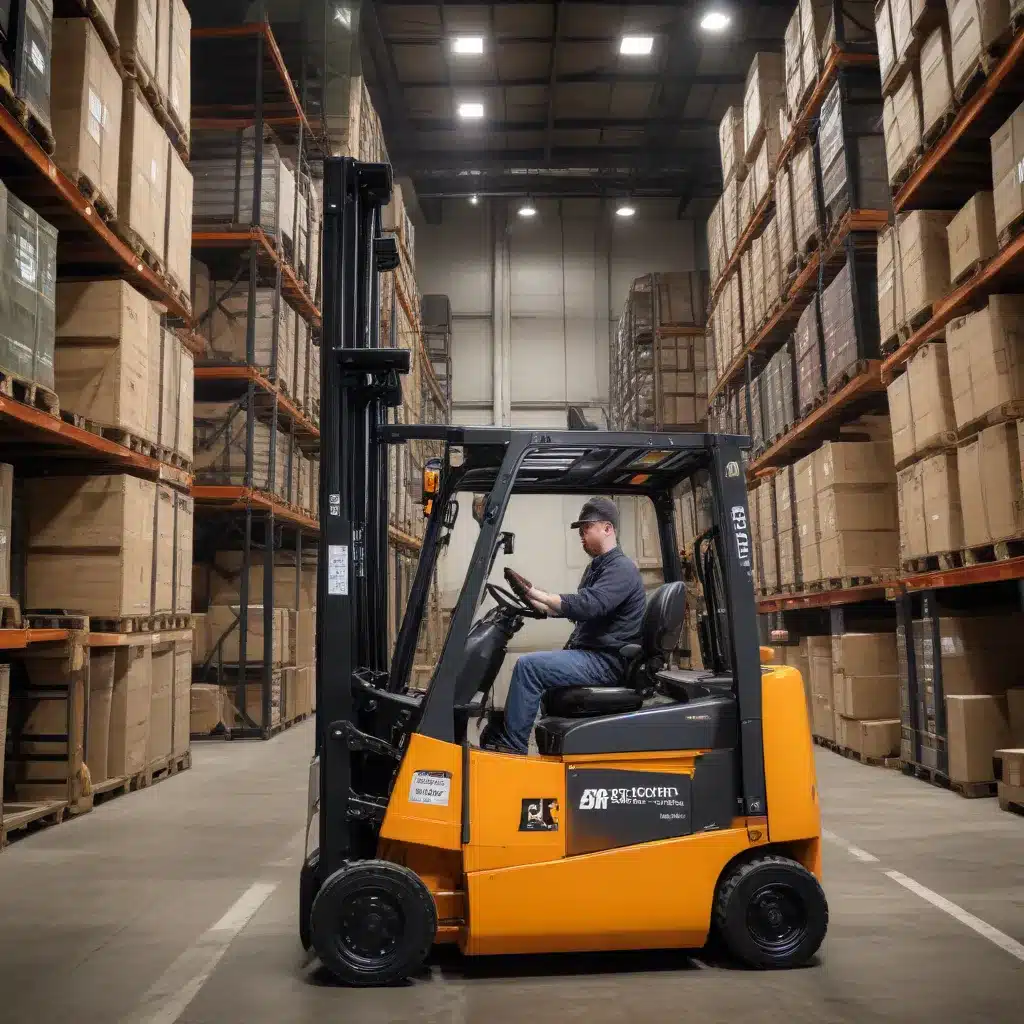
The Rise of Teleoperation in Logistics and Material Handling
In today’s fast-paced, technology-driven world, the logistics and material handling industries are constantly seeking innovative solutions to improve efficiency, safety, and productivity. One such transformative technology that is rapidly gaining traction is forklift teleoperation – the remote control and operation of forklifts and other material handling equipment from a distance.
As the global teleoperation and telerobotics market is projected to reach $76.5 billion by 2026, the potential of this technology to revolutionize supply chain operations is undeniable. Forklift teleoperation empowers workers to control and operate forklifts remotely, unlocking a wealth of benefits that address some of the industry’s most pressing challenges.
Enhancing Safety in Hazardous Environments
One of the primary advantages of forklift teleoperation is its ability to enhance worker safety, particularly in hazardous environments. The logistics and material handling industries are notorious for their high rates of forklift-related accidents, with over 7,000 such incidents occurring each year. These accidents not only put workers at risk but also result in significant financial burdens, with the average cost of a forklift accident reaching $42,000.
By allowing operators to control forklifts from a remote location, teleoperation eliminates the need for human presence in potentially dangerous areas, such as warehouses with hazardous materials or extreme temperatures. This not only protects workers from physical harm but also reduces the risk of exposure to harmful substances or conditions. Furthermore, the reduced need for on-site personnel can lead to a significant decrease in workers’ compensation claims, ultimately lowering operating costs for businesses.
Bridging the Labor Shortage
The logistics and material handling industries have long grappled with labor shortages, a challenge that has only been exacerbated by the COVID-19 pandemic. According to the 2022 MHI Annual Industry Report, robotics and automation are expected to reach 79% adoption in the coming years, as businesses seek to address these labor challenges.
Forklift teleoperation offers a unique solution to this problem by enabling remote workers to operate forklifts from anywhere in the world. This allows organizations to tap into a larger pool of talent, regardless of geographic location, and deploy their workforce more effectively. By expanding the reach of their labor force, companies can better respond to fluctuating demand and ensure that critical operations continue uninterrupted, even in the face of staffing shortages.
Moreover, the integration of advanced technologies, such as AI and machine learning, further enhances the capabilities of teleoperated forklifts. These systems can learn from data, improve decision-making, and perform complex tasks with greater accuracy and efficiency, ultimately augmenting the effectiveness of remote operators.
Increasing Operational Resilience and Efficiency
In addition to enhancing safety and addressing labor shortages, forklift teleoperation also contributes to improved operational resilience and efficiency. By enabling remote control and supervision of material handling equipment, teleoperation allows for real-time monitoring and rapid intervention in the event of equipment malfunctions or unexpected operational challenges.
This level of oversight and responsiveness is particularly valuable in dynamic, high-volume environments, such as warehouses and distribution centers. Teleoperated forklifts can be quickly rerouted or adjusted based on changing conditions, optimizing workflow and minimizing downtime. Furthermore, the integration of cloud-based robotics as a service models can further enhance the scalability and accessibility of these remote control solutions.
Revolutionizing the Forklift Operator Experience
Forklift teleoperation not only benefits organizations but also transforms the work experiences of forklift operators themselves. By moving operators from the warehouse floor into a comfortable, remote control center, teleoperation enhances the overall work environment and job satisfaction.
Operators no longer need to navigate hazardous conditions or contend with physical limitations. Instead, they can control forklifts from the safety and comfort of an office setting, while still contributing their expertise and skill. This shift also reduces the risk of workplace injuries, a common concern in the material handling industry, potentially leading to lower workers’ compensation costs and improved employee retention.
Integrating Teleoperation into the Supply Chain
As the logistics and material handling industries continue to evolve, the integration of forklift teleoperation is becoming increasingly critical. Leading companies, such as ArcBest and NFI Industries, have already begun to invest heavily in this technology, recognizing its potential to transform supply chain operations.
By partnering with innovative providers like Phantom Auto, these organizations are leveraging remote operation platforms that enable their workers to control forklifts and other material handling equipment from anywhere in the world. This not only addresses labor shortages but also enhances safety, productivity, and overall operational resilience.
The Future of Forklift Teleoperation
As the teleoperation and telerobotics market continues to evolve, the future of forklift operation is poised to undergo a significant transformation. Advancements in communication technologies, such as 5G and mobile edge computing, are unlocking new possibilities for remote control, enabling low-latency, high-reliability connections that are essential for effective teleoperation.
Furthermore, the integration of AI-powered autonomy into teleoperated forklifts will further enhance their capabilities, allowing for more intelligent decision-making and adaptability in complex environments. This convergence of human expertise and advanced automation will redefine the role of the forklift operator, paving the way for a more efficient, resilient, and technologically advanced material handling landscape.
Conclusion: Embracing the Future of Forklift Operation
The rise of forklift teleoperation represents a pivotal moment in the evolution of the logistics and material handling industries. By empowering workers to control forklifts remotely, this technology addresses a multitude of challenges, from enhancing worker safety and bridging labor shortages to improving operational efficiency and resilience.
As the global teleoperation market continues to grow, savvy organizations that embrace this innovative solution will position themselves for long-term success, adapting to the changing landscape and staying ahead of the competition. By leveraging the power of forklift teleoperation, the logistics and material handling sectors can unlock new levels of productivity, safety, and agility, ultimately delivering greater value to their customers and driving the industry forward.
To explore how your organization can benefit from forklift teleoperation, visit ForkliftReviews.com and discover the latest advancements in this transformative technology.

